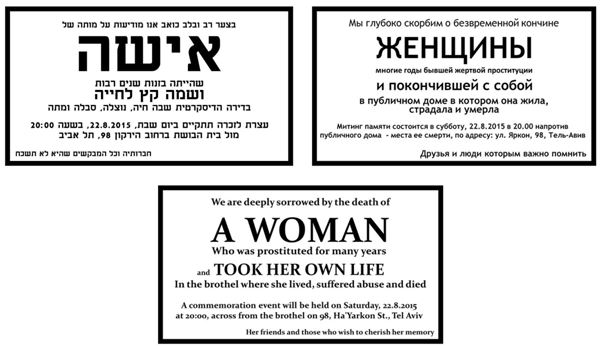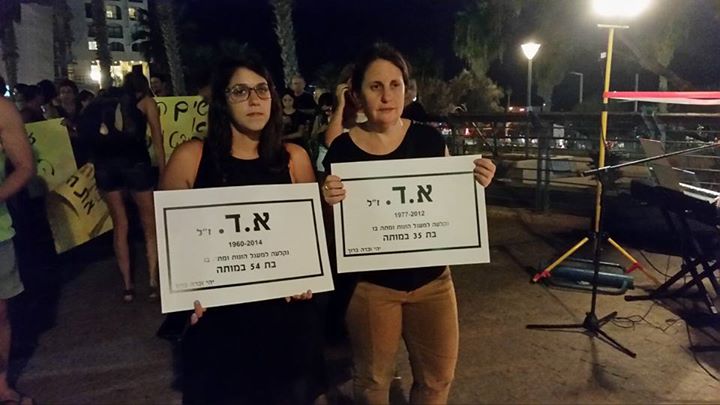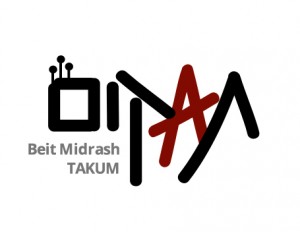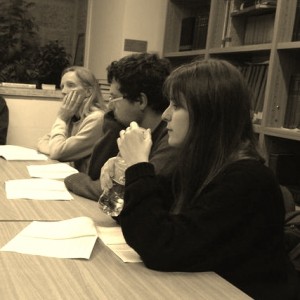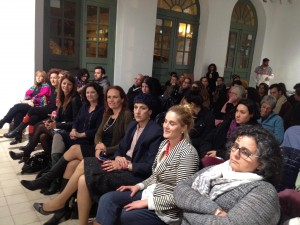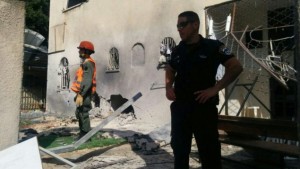By Lauren Dellar, ATZUM’s Grants Coordinator
On August 13, 2015, a young woman, G, took her life at the 98 Hayarkon Street, Tel-Aviv brothel where she was prostituted. She could no longer bear the torture and torment of being brutalized nightly. I spoke with Michal Leibel, Director of ATZUM’s Task Force on Human Trafficking, to discuss this tragic event.
Why do you feel that G’s suicide struck so responsive a chord with Israel society?
ML: G, who made aliyah from the former Soviet Union at 15, led a life of humiliation and agonizing pain as a prostituted/trafficked person. She had to drink and drug herself each night to steel herself in preparation to “service” 20-30 of the brothel’s johns who paid to repeatedly rape her. Given the fact that she was a prostituted woman and an addict, both carrying tremendous social stigma, it is really astonishing the Israel public has sympathized so deeply with her pain and mourned her death.
Why such public outcry at this particular time?
ML: It’s hard to know exactly, but first, the public has been exposed to increasing coverage of the sordid story of Einat Harel, 51, known as the Tel-Aviv Madam, who ran a brothel for a decade. In July, 2015, she was indicted for pimping, soliciting for prostitution and money laundering on an unprecedented scale. Soon after, Israel’s daily Yediyot Ahronot published an article about her which was followed by an interview with Guy Peled on the August 31 segment of Channel Two’s highly popular Friday night program regarding her most recent indictment. Without compunction, Ms. Harel stuck to her story – prostitution empowers women and enables independence – and suggested the police pursue “real criminals” instead of hounding those who seek to facilitate free enterprise.
The public, however, wasn’t having any of it. There was huge online response, slamming the interviewer for giving this woman a platform to glamorize and legitimize prostitution as simply a lifestyle choice. I am glad to say viewers saw through the lie and are starting to engage the evil of prostitution in a serious manner.
Second, the much respected Jerusalem Film Festival recently screened an important documentary – “Strung Out” (English title) or “Bat Zona” (“daughter of a whore”). The movie, exceedingly painful, relates in a very sensitive manner the story of a group of young women living on the streets of South Tel-Aviv, victims of heroin and prostitution. Again, the public was challenged to consider their preconceptions about prostitution. The film went on to win the Van Leer Award for Israeli Cinema – Documentary Film.
What was TFHT’s initial response?
ML: When G’s story broke, we understood first and foremost the need to recognize her passing in a respectable manner. (G is a moniker initially used by the press; we continue to refer to her as G as she has family in Israel, including a sister she helped support, whose identity we seek to protect.) The Task Force initially posted a public death notice (customary practice in Israel upon the passing of a loved one or revered member of the community) in Hebrew, English, and Russian on social media platforms. We also wanted mainstream press to step up. We asked Elem, Israel’s leading organization working with troubled youth, including prostituted teens, to approach Ha’aretz and use their influence to urge them to post the notice pro bono. They did. This was extraordinary, the first time notification of the death of a person identified as a prostitute was published.
What happened next?
Soon the notice attracted social media attention. In response, the Coalitzia l’ Ma’avak Bznut (Coalition for the Fight Against Prostitution), facilitated by TFHT, sprang into action. The Coalition is comprised of women who are victims of trafficking and have escaped prostitution, and NGOs working on issues related to ending prostitution and aiding prostituted persons. Our initial intent was to issue a collective statement to the authorities and appeal in writing for closure of the brothel on 98 Hayarkon Street, the decrepit brothel where G worked and took her life.
Did the Coalition make any formal appeals in this regard?
ML: A letter penned by the Task Force in the name of the Coalition was addressed to Gilad Erdan, Minister of Public Security, Shlomo Lamberger, Tel-Aviv District Prosecutor, and Benzi Sau, Tel-Aviv Police Commissioner. In it we called for immediate closure of the brothel. The letter further demanded prosecution of its owners and management on charges of pimping and owning and running brothel. We also urged the authorities to consider adding another charge, negligent homicide, for inducing a person to commit suicide as there is precedent for such a charge in Israel.
How else did the Coalition respond to the public outrage over G’s death?
ML: The Coalition partners also wanted to organize a public commemoration ceremony to give voice to people’s grief, and pay tribute to G and other women brutalized through prostitution and trafficking. We sought a public permit to gather in front of the brothel and were granted permission to assemble in a garden two houses away. Having opened a Facebook event, public interest grew at an amazing pace. Within hours, conventional media sought interviews with TFHT and Coalition partners for current commentary and insights.
We thought 50-100 people would show up. However, once we understood that the death announcement had reached the Facebook accounts of more than 97,000 people, we saw that it was going to be a different type of event. Requests to help started pouring in and we included everyone.
There has been so much written about the event which seemed to galvanize so many. Can you share more about it?
ML: TFHT facilitated the evening, which began with a minute of silence and was followed by a somber reading of a list of 42 people and their ages at the time of their deaths, all of which were related to being prostituted and trafficked. These women, and one young man, lost their lives over the last five years through murder, suicide, STDs, drug and alcohol addiction, and the physical and emotional toll of unrelenting abuse and exploitation. Some were killed by cars as they stood on the street to attract clients in order to meet their nightly quota required by their pimps. This practice of reading names in memoriam is an important Jewish tradition. People’s names are important. Their lives were important.
All who so desired, spoke. Included were women who had escaped prostitution, Coalition members, MK Merav Michaeli (Zionist Union), and mayoral advisors. Beyond the speeches, the evening gave platform to those who sang and shared their poetry. Well-known artist Yuval Goldenberg sang some of her original pieces; Adi Arnon sang the haunting “Alfonsina y el mar” in homage to one who has taken his or her life; and Michal Givony sang “Lean on Me” and “Blackbird”. Two Israeli poetesses read their work created for the evening. Marva Zohar recited “In memory of G” and Inbal Eshel Cahansky read a poem about the experience of prostitution. It was very powerful.
In the end, how many people attended?
ML: Nearly 900 men and women joined. Others have since learned about the event, as it was filmed by Chen Peter of Social TV. Yuval Feder made a beautiful video of the evening. After the ceremony, the crowd and passersby gravitated toward the brothel, blocking entry and protesting. Two women prostituted in that brothel told one of the other organizers: “Kol hakavod, good that you woke up. It really says something to us that so many people came to honor G. You just can’t imagine how many other Gs there are.”
What was the initial outcome of the event?
ML: I’m glad to say that the police issued a closure order to the brothel two days later and we hope that will hold and the relevant people will be charged. But much need be done: 98 Hayarkon, a place well known to the police, is but one of 200-250 brothels and “discrete” apartments in Tel-Aviv where women and girls are prostituted daily .
How will you pursue this goal and how will you continue to bring the press and public more deeply into the cause?
ML: There was a remarkable amount of media attention, which is great given how powerful the press is in shaping public opinion. People are beginning to understand that a civil, caring society cannot tolerate the systematic rape of women, men and transgender people. Since G’s suicide, TFHT and other NGOs have been approached by print, radio and television journalists on a daily and sometimes hourly basis. The question is what will happen after this is no longer headline news? [List of links is available below.]
ATZUM, in partnership with the law firm of Kabiri-Nevo-Keidar, will continue to assert the urgent need for Israel to pass Nordic Model legislation, the international standard designed to criminalize pimps and johns and protect the prostituted person, nearly always a victim of past sexual abuse. Since 2003, the Task Force has lobbied and called on all Members of Knesset and government ministers to pass such legislation, the best means of saving people from the brutality of prostitution and trafficking. In each successive government, the Task Force has secured increased support. However, given Israel’s unscheduled elections, we have had to remount our campaign every few years. I am hopeful that people, now outraged, will join in demanding that Israel’s lawmakers protect the prostituted person and support their reintegration into the workforce.
But not everyone supports Nordic Model legislation.
ML: The proposed law based on Nordic Model legislation is not a panacea and has its detractors. I was interviewed on August 23 by Attila Somfalvi on Ynet’s online news program with another lawyer, Noga Wiesel, who opposes Nordic Model legislation. She argued that entering prostitution is a personal choice. I understand the logic of such an argument yet it does not take into account that the vast majority of prostituted women are indeed victims of incest, rape and abuse in childhood and through adolescence. Further, too many young women may be drawn to prostitution, assuming it to be “easy money”, not comprehending its dreadful personal costs.
The notion of personal choice as a major factor discounts the massive number of women who are coerced, tricked and trafficked into prostituting themselves. In many cases, these young women are literally sex slaves, raped nightly with no means to change their situation. This is happening in our midst and, in some cases in plain sight of law enforcement officers. I can tell you, it’s easy to get into prostitution, nearly impossible to get out.
How easy is it?
ML: On August 20, Tzinor Lila, a TV show that examines trending social media issues tested it. On air, journalist Noa Zlotnik, identifying herself as someone with no prior experience in prostitution, answered an ad looking for women. When she asked about how she might find out more, the pimp responded, “I’m a little short on girls today. Come now. The others will show you what to do.” The entire conversation took a few minutes! It’s about time we all understand that purchasing sex is not legitimate, that for every hour a john pays for sex with a woman they are financing a tragic exploitation of another human being’s body and soul.
What do you take away from these past few weeks?
ML: The cause itself has greater credibility, more legitimacy. TFHT, the only Israel NGO solely focused on legislative change (and other NGOs working to shelter prostituted women and seek their reintegration into society) has increased public support. For the first time, the individual and social cost of prostitution is now part of the public discourse. In Israel, where political and existential crises demand our daily attention, it is not easy for issues of social relevance to become and remain part of the public agenda.
Also, it seems that something had changed. If three years ago ninety percent of media talkbacks were hostile towards prostituted women, judging them and assuming prostitution to be a profession one chose on par with being an accountant, a nurse, or a lawyer, we now see a shift. We are starting to realize the fruits of our long sustained efforts (with thanks to those who have supported us with their time and financial resources) and believe that together we now make a stronger case addressing the critical issue of demand, and gaining ground in passing legislation to protect women from G’s fate.
Public comments like, “G was a person…she doesn’t deserve our condemnation and judgment.” “I am so sorry for this poor woman who was prostituted out of distress. We should all respect her memory – RIP” suggest we are entering a new era.
The Knesset is now in recess so we don’t have an immediate opportunity to lobby its members and government ministers. However, we are in ongoing contact with Shuli Moalem Rafaeli (Ha Bayit Hehudi), Zehava Gal-On (Meretz) and Merav Michaeli (Zionist Union), who support our cause and are dedicated to promoting the bill TFHT recently authored.
Additional Links
- Task Force on Human Trafficking
- The Jerusalem Post 23.8 Police close Tel Aviv brothel after suicide
- The Times of Israel 24.8 Police close brothel after prostitute suicide
- The Jerusalem Post 25.8 Suicide at brothel highlights the status of sex workers in Israel
- i24news 24.8 Tel Aviv brothel closed by police after sex worker commits suicide




